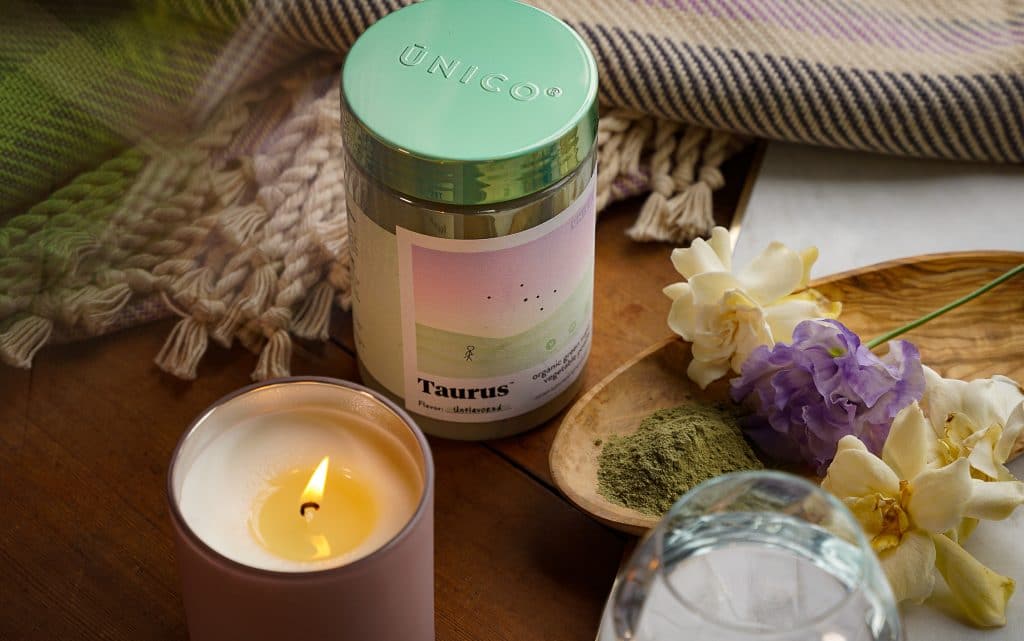Ah, Adaptogens. Those quirky botanicals that you have heard OF but don’t REALLY understand. You hear your ‘bio-hacking’ friends chatting about them in excited tones. Claiming better sleep. Improved energy (without Starbucks). And most importantly- way less feeling stressed.

Adaptogens sound pretty great already, right? Of course they do!
Who doesn’t want something that’s all-natural, that can reduce the feelings of stress and anxiety?
The truth is that to many, (including myself before I tried them) adaptogens sound too good to be true.
And as you have likely already found- there is an overwhelming amount of information available out there about individual adaptogens.
- Do a quick Google search for ‘adaptogens’ and you will be met by over 4.1 million search results.
- A search for ‘adaptogen’ on Amazon reveals over 1,000 results – yielding countless listings for adaptogenic products ranging from adaptogenic teas and drinks, to individual adaptogen pills…
- Influencers and biohackers all over instagram are mixing up adaptogenic elixirs left and right…
Many think that this is just the beginning of a sort of ‘adaptogenic revolution‘.
With so many stressors in our everyday lives (HCA summarizes stress as the ‘Health Epidemic of the 21st Century’1), it is no surprise that adaptogens are finally emerging into the mainstream.
But what exactly are adaptogens? And do adaptogens actually work?
Let’s explore these two important questions first.
What are Adaptogens?
Adaptogens are natural substance(s) considered to help the body adapt to stress and to exert a normalizing effect upon bodily processes.2
The key word is ‘normalize’.
Daily stressors around work, family, finances, major life events, political tensions, and of course this year, a global pandemic, can take a toll on the part of our endocrine system responsible for managing the stress hormones such as cortisol and nor-epinephrine (also known as adrenaline).
Adaptogens work by helping normalize your body’s stress response systems, and restoring them to optimal function.
Think of it as a re-balancing of the systems in your body that manage stress.
More specifically, the compounds in adaptogens act on the sympathetic nervous system (SNS), and hypothalamic pituitary adrenal (HPA Axis) to control the levels of hormones produced that make us ‘feel’ stress.
Another great way to think of it (or rather an ‘easier way’ to think of it!), as explained by Dave Asprey (popular author best-known for popularizing the ‘Bullet Proof’ coffee trend):
“Think of it like this. If you’ve ever driven a sports car, when you step on the gas, it very quickly moves forward, and when you let off, it slows down quickly. In contrast, in your grandmother’s car, you can pin the accelerator to the floor, but you have to wait two seconds for the car to lurch forward. When you release the gas, it kind of coasts.
Your adrenals are the same way. You want them to make stress hormones quickly when needed, then to stop making the hormones as soon as you’re done. That’s what adaptogens do – they make your adrenals react more quickly, so you spend less time and energy making stress hormones.“
The best thing about these is that they are all-natural. Along with the healthiest vegetables, this class of natural plant species can help improve your health naturally.
Now that you have a good understanding of WHAT adaptogens are, let’s explore how they came to be.
Where do Adaptogens Come From?
Even though adaptogens are only just now becoming more mainstream in modern society as natural stress relief supplements, they were actually first discovered and put in use thousands of years ago (evidenced by written records as early as 200BC!) by the early proponents of traditional Ayurvedic medicine.
Ayurvedic medicine is a holistic approach to health and wellness that incorporates, natural, mostly plant-based herbs and botanicals.
Hundreds of species of plants with healing properties were identified in the original Ayurvedic tradition in India, and throughout the far East.
Among them, the popular adaptogens that are just now gaining popularity such as rhodiola, schisandra, astragalus, and reishi.
Throughout the course of history, adaptogens were used in a variety of different ways, by different nations:
- Chinese Emperors used Asian Ginseng as a tonic
- Shaolin Monks used reishi to improve concentration
- Nordic vikings used Rhodiola for strength and stamina
- Physicians in Ancient Greece used Rhodiola (rhodiola rosea) to heal patients naturally
- Russian Doctor Nikolai Lazarev coined the term ‘adaptogen’ while developing a natural performance enhancing supplement for Soviet Olympic athletes
- Eleuthero (Siberian Ginseng) and Rhodiola are used by American astronauts and athletes to reduce stress and improve performance
Do Adaptogens Actually Work?
The concept of reducing stress, and optimizing your stress-response naturally sounds great- but is it too good to be true?
Some say that adaptogens are NOT as effective as some of the proponents of them claim – pointing to a lack of recent formal scientific studies.
A popular editor on Self.com claims that very few studies on adaptogens have actually been published.3
However, there are in fact over 75 studies4 that have been conducted with adaptogens, although very few focus on adaptogens ability to reduce stress levels. The majority of the studies focus primarily on cognitive performance and recall.
While much more formal research will be conducted due to the growing attention that adaptogens are receiving, for now most of the evidence supporting the effectiveness of them is anecdotal.
That being said, the anecdotal evidence has been quite compelling.
There are thousands of 4, and 5-star reviews on Amazon for Adaptogenic products. Users report feeling ‘energized without feeling jittery’, or ‘best sleep I’ve ever had in my life’… some others compare the stress-relief benefits to being as strong as prescription depression medicine.
One of Healthline.com’s authors published a review on her experience with adaptogens, stating that her stress levels went from “an 8-9 to about a 5” after one month of taking adaptogens.5
Some of the most effective adaptogenic products combine several adaptogens in one – such as the combination of KSM-66 Ashwagandha and rhodiola in our Taurus Green Vegetables & Superfood blend.
The list of the benefits of adaptogens is quite impressive, and continues to grow:
- Improved response to stress / stress reduction
- Improved sleep quality
- Better immune function
- Increased libido / sex drive
- Enhanced cognition, memory, and recall
- Higher natural energy levels
The overwhelming amount of positive experiences with adaptogens have led many to experiment with these natural stress relief supplements on their own.
If you’re looking to try adaptogens for stress, here are a list of some of the most effective, and most popular ones:
The 5 Best Adaptogens for Stress Relief:
Ashwagandha (Withania somnifera): Sometimes known as ‘indian ginseng’, ashwagandha is the king of all adaptogens, with the most scientific / clinical research behind it.
Rhodiola (Rhodiola rosea): One of the oldest, and most popular adaptogens throughout history, this root grows in the mountainous regions of Europe and Asia, and helps the body respond to stress more efficiently.
Holy Basil (Ocimum tenuiflorum): Also known as ‘tulsi’, Holy Basil is still worshipped by some Hindu cultures, and used widely to reduce stress and even boost longevity. It is used commonly for cooking as well, and is spicier than normal basil.7
Astragalus (Astragalus propinquus): Astragalus, while not used as often for stress/anxiety relief, is one of the most popular adaptogens, and is highly regarded as a natural anti-inflammatory, and immunity-booster.
Schisandra (Schisandra chinensis): Schisandra is a plant that has been used for thousands of years to support the endocrine system, and is used as a natural energy and performance booster.
While all five of these adaptogens may have powerful stress-relief properties, there are several natural dietary ingredients that may go a step further in providing a natural way to combat depression.
Adaptogen FAQ’s:
Can I take adaptogens if I am nursing / pregnant? While adaptogens are considered safe, it is best to consult your primary care physician before starting any new supplement regimen, including adaptogens.
Do adaptogens affect birth control? While many supplements like St. John’s Wart, Saw Palmetto, and even garlic capsules can affect birth control, adaptogens are not typically known to interact with oral contraceptive medications. That being said, it is still important to double check with your doctor before staring an adaptogen supplement.
Are adaptogens safe for women? Yes, adaptogens are generally considered safe for both men & women alike.
Can you take too many adaptogens? Typically, taking a high dose of adaptogens is not going to cause an adverse reaction, however, most agree that adaptogens should be taken responsibly, rather than spontaneously in an attempt to spot-treat a condition.8
IMPORTANT NOTE: Supplements are not a permanent solution to chronic stress disorders. If you have consistent anxious/depressive moods or suicidal thoughts, please consult your primary care physician as soon as possible.
Sources:
1https://hcatodayblog.com/2019/04/30/stress-the-health-epidemic-of-the-21st-century/
2https://www.lexico.com/en/definition/adaptogen
4https://www.ncbi.nlm.nih.gov/pmc/articles/PMC3991026/
5https://www.healthline.com/health/mental-health/i-tried-adaptogens-for-stress
6https://www.ncbi.nlm.nih.gov/pmc/articles/PMC6240259/
7https://www.verywellhealth.com/holy-basil-4766587
8https://www.wellandgood.com/good-advice/adaptogen-overuse-negative-effects/slide/2/
Recommended Reading:
- Holiday ‘Jingle Balls’ – A Festive Take on No-Bake Protein Balls - December 20, 2023
- Cryptic Cold Brew – A Must-Try for the Most Mischievous - October 31, 2023
- Does Protein Powder Make You Gain Weight? - October 4, 2022
